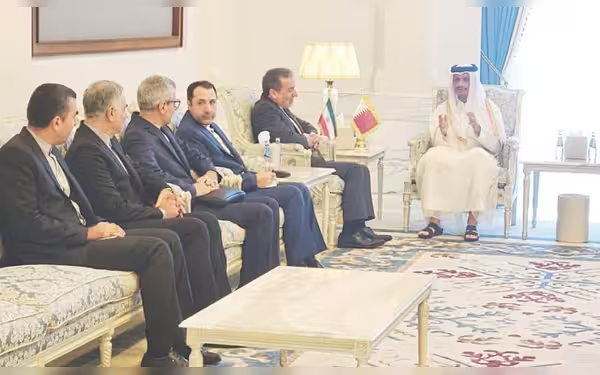Saturday, November 16, 2024 07:30 PM
Iran's Foreign Minister Visits Qatar Amid Rising Tensions with Israel
- Iran's Foreign Minister meets Qatari counterpart in Doha.
- Israel warns of retaliation following missile attack.
- Qatar seeks to enhance regional security and stability.
 Image Credits: dawn
Image Credits: dawnIran's Foreign Minister visits Qatar as Israel warns of retaliation, highlighting the urgent need for regional stability amid escalating tensions.
In recent developments, Iranian Foreign Minister Abbas Araghchi visited Doha, Qatar, to meet with his Qatari counterpart. This meeting comes on the heels of a warning from Israel, which has threatened to retaliate against Iran following a missile attack attributed to the latter last week. The situation in the Middle East remains tense, with ongoing conflicts in Gaza and Lebanon drawing international attention.
Qatar has emerged as a significant player in the quest for peace in the region, actively working to secure a ceasefire in Gaza and advocating for a truce in Lebanon. The discussions between Araghchi and Qatari Foreign Minister Sheikh Mohammed bin Abdulrahman Al Thani focused on the escalating violence and the need for diplomatic solutions. According to Iranian foreign ministry spokesman Esmail Baghaei, the talks were described as “important consultations” aimed at addressing the crises affecting both Gaza and Lebanon.
During the meeting, Sheikh Mohammed expressed Qatar’s “full readiness to do everything possible to enhance security and stability at the regional and international levels.” This statement underscores Qatar's commitment to fostering dialogue and cooperation among nations in the region. The discussions also highlighted the urgent need for all states to work together to prevent further violence, with Baghaei emphasizing the responsibility of nations to shield the region from “an imposed catastrophe.”
Araghchi's visit to Qatar followed a series of diplomatic engagements in the region, including a meeting with Saudi Crown Prince Mohammed bin Salman. Tehran has indicated that these talks aim to create “better conditions” for Palestinians and Lebanese who are suffering due to ongoing Israeli attacks. Iranian President Masoud Pezeshkian, who visited Qatar last week, reiterated that Iran does not seek war with Israel but warned of a stronger response if Israel retaliates against its missile attack.
The backdrop of these discussions is a year-long conflict in Gaza, which has seen Israel intensifying its military operations against Hezbollah in Lebanon. Following the events of October 7, Hezbollah has retaliated against northern Israel, prompting Israel to ramp up its strikes targeting Hezbollah leaders and infrastructure. This cycle of violence raises concerns about the potential for a wider conflict in the Middle East.
Analysts suggest that Iran's diplomatic outreach is a strategic move to demonstrate its commitment to de-escalating tensions with Gulf states. Neil Quilliam, a Middle East analyst, noted that Iran aims to convey a message to both the United States and Israel that its efforts to improve relations with neighboring countries are genuine and yielding results. He warned that if Israel pursues a broader conflict, it risks damaging its relations with the UAE and Bahrain, while also acknowledging the warming ties with Saudi Arabia.
As the situation unfolds, it is crucial for all parties involved to prioritize dialogue and diplomacy over military action. The stakes are high, and the potential for further escalation could have dire consequences not only for the region but for global stability as well. The international community must remain vigilant and supportive of efforts aimed at achieving lasting peace in the Middle East.













